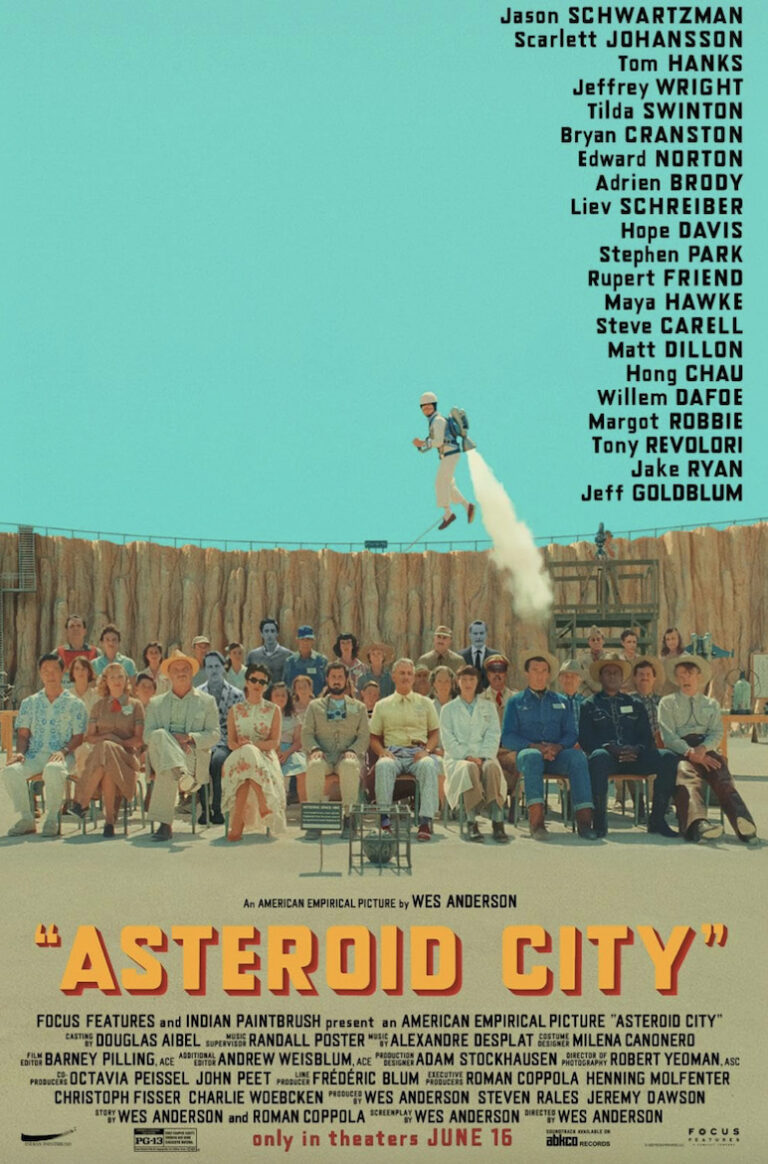
Synopsis : The itinerary of a Junior Stargazer/Space Cadet convention (organized to bring together students and parents from across the country for fellowship and scholarly competition) is spectacularly disrupted by world-changing events.
Rating: PG-13 (Some Suggestive Material|Smoking|Brief Graphic Nudity)
Genre: Comedy, Drama, Romance
Original Language: English
Director: Wes Anderson
Producer: Wes Anderson, Steve Rales, Jeremy Dawson
Writer: Wes Anderson, Roman Coppola
Release Date (Theaters): Wide
Box Office (Gross USA): $10.3M
Runtime:
Distributor: Focus Features
Production Co: Focus Features, American Empirical Pictures, Indian Paintbrush
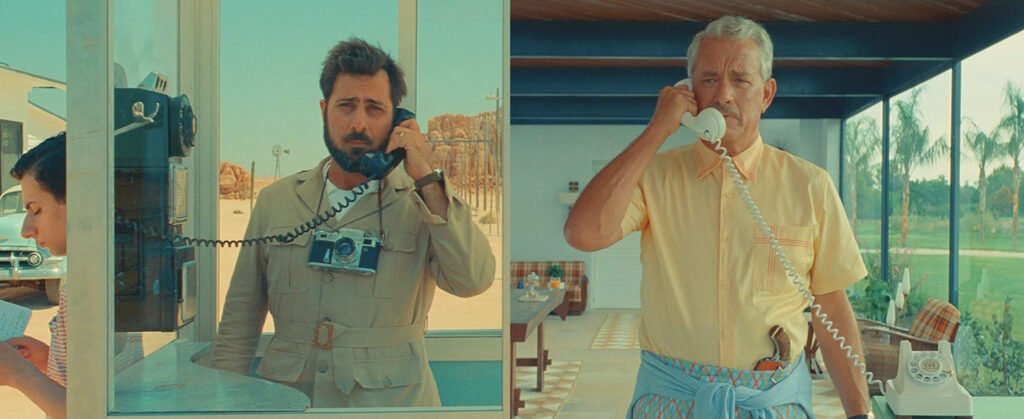
Q&A with Actor Bryan Cranston
Q: Bryan Cranston, you pop up on screen and say we’re going to take a tour of a movie that doesn’t play and that doesn’t exist. How do we explain that to you?
BC: When Wes Anderson calls, you just say yes before he finishes his sentence. You can only step in and visit the mind of Wes Anderson and when you read one of his scripts, it is very dense. He puts in everything that’s going on in his mind, which is from the physical to the manner of speaking to what’s happening in the scenery, to the music and so on. It’s a very dense read.
I’ve got to go back, and see what is that? Which character was that? You can imagine in a movie like this where all the actors are also actors in a place. What he does, Alfred Hitchcock did many, many years ago. He started by doing storyboards and he would storyboard all his movies, basically helping him direct the movie before he actually directs the movie. He started that and he would x them off as soon as he got each seven.
In a way, Wes does the same thing, but he does it in what’s called animanic. For those of you who don’t know what that is. It’s a very rudimentary sketch drawing, a cartoon as he refers to the entire movie. He does a little sketch drawing of each movement where the character may be back and walks toward you and he turns and looks that way. He does each frame of that for the entire movie — the hour and 45 minutes —and he voices all the characters and then he hands it to us, the actors in the form of a laptop and we watch the entire movie as it’s played out.
You see your character being voiced by him and then it really starts to dawn on you. “Oh, I see. What he wants from me. I see where he’s going,” but not really. What’s really interesting is as there was a scene in there where Augie [Jason Schwartzman] burned his hand and then he goes in and talks to the director and says, “I just don’t understand why he would burn his hand. I don’t get it.” And he said, we don’t always understand.
You just have to keep telling your story and that to me in a nutshell is what this movie is about. There are some questions that we ask that may be even existential like, “Are there aliens on other planets? And then there are very practical questions that we ask that we don’t know about life. We don’t know where our lives are going or how long we’ll live or all these things. There are many, many questions that we will never get the answer to. You just keep moving, keep telling your story, keep putting one foot in front of the other and try to be happy. I really think that’s it. It’s an over-simplistic look at it, but maybe that’s the way we should move our lives.
Q : One of the things about your role as the narrator in particular, it’s like Edward Murrow meets Rod Serling is the vibe. It’s the connection between the two and sometimes they bleed through from one scene to the other.
BC: I looked [to] them. I love Rod, Edward R. Murrow, Walter Cronkite and Ted Koppel. In fact, Koppel’s voice kept sinking in. As an actor, you’re always looking for what I call a handle, something that you can hold on to, that gives you a sense of security within a character because otherwise you’re just kind of floating until you grab these handles and hold on to them. You feel like you haven’t been grounded yet within the character — for lack of better explanation.
So I swirled around all of those guys my first day doing the paragraph [read] right before the train sequence. My very first time I had paragraphed a little and Wes comes to me and goes, “Yes. Right. Very good. Yes.” He always pushes his hair behind his ear. “It looks really, really good. Now I just need it much, much faster. Yeah.” Sometimes you’re talking faster than you think. That’s part of the Wes Anderson sound, it’s the lyrical orchestration of the words that put us together.
Q: And then of course, there’s the cinematic construct that he’s known for, did you have feedback?
BC: I can’t remember his name but, remember the guy who boasted about everything and then the aliens picked him up, what was that one called? He was a raconteur and boasted about that. Well, I used to be able to do this and that and then this guy came to town and just happened to have a weapon on him. This guy just boasted and lied about this enormously colorful life that he had. So when the aliens came down, they said, “Let’s get that guy,” and he had convinced the aliens that he was just lying about it. So the aliens realized, “Oh he’s just lying. Let’s leave him alone.” Then in the last scene he’s going back and telling his friend about the aliens. There we go.
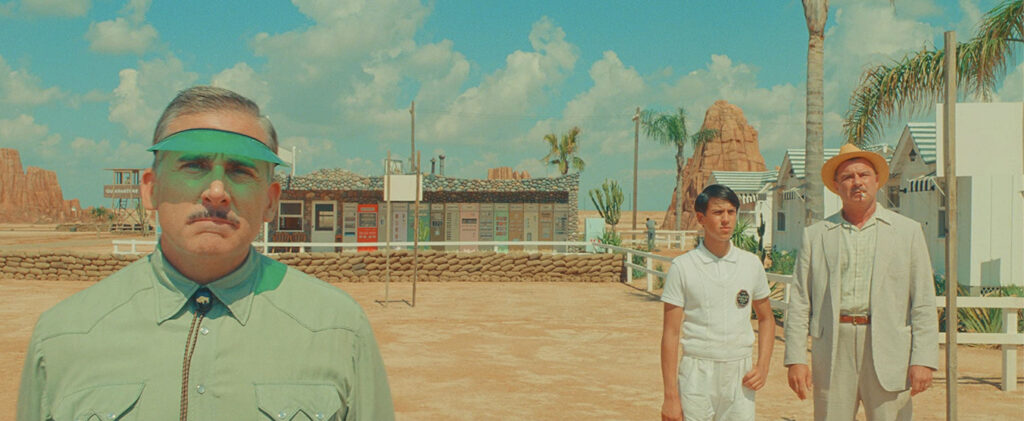
Q: When the alien shows up repeatedly and, specifically, in the black and white section in the actors studio, they’re all chanting and there’s just that moment of community watching that moment. That gets such an intense visual reaction to it — to see actors connect in that moment. Have you’ve ever had an experience like that?
BC: There’s been so many. The more you prepare, the more you’re welcoming any kind of extraordinary moment. I remember the great actor Shirley Knight; I took acting classes from her and she said every actor needs to have applied four actions. She said the first is relaxation and it’s so true that if an actor can’t be relaxed, you can’t do your best work. For the actors here, you’ll know the times you’ve been nervous or seen other actors nervous, they have a hard time remembering their lines.
They’re thinking about anything but their character, Everything is nervousness, sweating and it’s like that, so the first and foremost thing is how to relax. The second is concentration. Only when you’re relaxed. Can you have concentration? And when you’re concentrated, then your imagination can click in, then you can think of interesting little things that you can throw into a scene to make every take different. Sometimes if you do all that work, and it’s not often, but sometimes inspiration comes to you and it just pops out of the top of your head and everybody is like, “Oh my God, what just happened?” And those are the cherished moments, but you cannot get there unless you first go through those steps.
Q: Speaking of inspiration, how does Wes function as a director? He’s great at production design but what is he like just directing you? What does that experience feel like?
BC: He’s a lovely human being. First off, for us [actors], he’s very kind, respectful, he loves and adores actors. I think when you look at this, a movie about a television show that’s doing an expose. It’s his homage to the performance of this, right? Wherever he shoots ,we are sequestered in a five star hotel. We have beautiful accommodations, the chef, everything, no one else in that hotel is connected to anything else. It’s all this movie.
So when he scouted in Spain to shoot a movie that takes place in the California desert, he had to make sure that there was this really great hotel and he even looked into some of the rooms to make sure that they were good. OK, everybody’s going to be happy because everybody makes the same amount of money on a Wes Anderson film. You don’t do it to make money.
What’s also nice is that there’s no hierarchy, no call sheet, no trailers and dressing rooms. You wake up in the morning, you go have breakfast or to the gym, you go to the wardrobe department, they have your wardrobe, you put it on, your microphones are pre planted. You will then walk over to wardrobe, hair and makeup, all within that hotel compound. You’re ready. Wes is ready to go about 9:30 or 10 o’clock in the morning. Never really early. You hop on this golf cart, you have to hang on and go to the set and you’re there in a kind of a green room hanging out.
You bring a book and he may need you for any of the scenes that you talked about early— where was my character — and all of a sudden, break that fourth wall and you’re in Asteroid City at the moment. That was an idea that he had in 94. Here’s the other thing — every night we all have dinner again. It’s like going to the actors again. It’s the most beautiful experience. There’s wine and food and people are talking.
You really get to know the people. You’re talking about the partners and someone’s parents who are not well or their children and you really, it’s the same every single night. It’s just a banquet. One night he came over to me, and said, “I need you tomorrow morning.” And I said, “Yeah.” We’re always right and you show up and he goes, “I want you to break the fourth wall and just slip into the scene, “Ok, what should I say?” Something like “Oh I made a mistake.” We were talking about something and he said, so I came up with that, that’s where it is.
Q: This is your second film with Wes. He has this troupe that he developed over the years and when you get together, they keep going together and have stories that they share? Do you fee al part of them? With two movies, do you think, did you feel like you’re definitely part of that?
BC: You have to jump in and embrace the spirit of a Wes Anderson movie. You also have to have a good spirit in a communal sense. If you’re a complainer, a rouser, if you bitch and moan then this is probably going to be your last movie with him because part of the real experience is having that interaction and play. On a day off, you play tennis together, go for bike rides or walk around the little town. It’s really an experiential thing.
The work, however, I will say is difficult. It is not easy because of the specificity of what he wants. You can imagine in that first direction, made faster, faster, faster. I remember one time we did that scene where Adrian Brody walks in and sees Hong Chau, his ex-wife, and they talk. Then it goes on a horizontal plane and we did that about 65/70 times. However, you notice there were no close ups on it. It was all kind of a big master take and so it took the same amount of time as we took to shoot the 3.5 pages.
It took about four hours, or something like that. One time, I swear, I was about an inch and a half off of being directly on my mark. I mean that much. Wes said, “Oh gosh Oh,” and I looked down, “Wow, let’s go again.” If you look at a nice little clip of Wes Anderson on youtube, it shows how exacting he is and how he frames things by halves, thirds, and quarters. Everything is very specific to him. That’s his style.
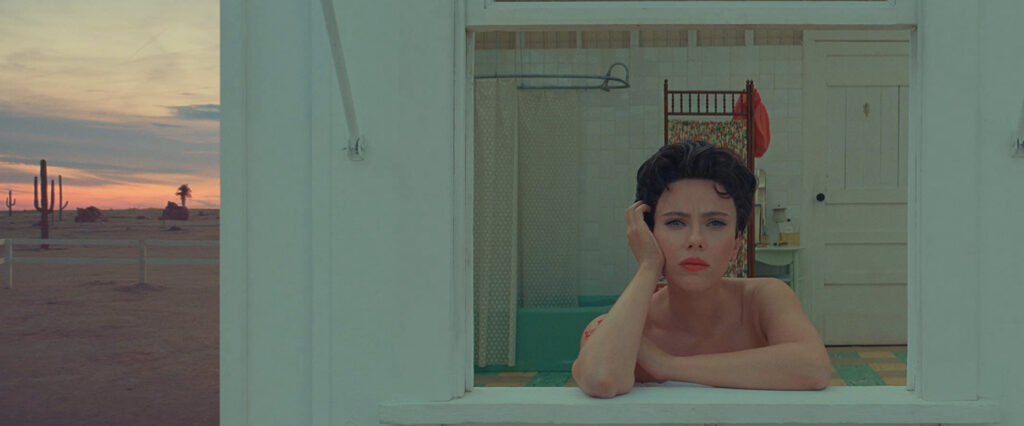
Q: Do you ever live in fear of being the actor not invited back?
BC: You know, it’s not for everybody. There are people who are not very social and don’t want to be a part of our active camp and that’s OK. There are those who just don’t like the way he works, which is kind of an inorganic approach. So for most of us as actors, you read the script, you’re inspired, and you start day one on collecting ideas about what his character might become and you’re throwing out ideas as you collect some, growing and developing this thing.
You do more research maybe on what your character’s profession may be, your relationships and things like that. You present it here — with Wes Anderson it’s the opposite of that. He shows you what he’s after. It’s almost like hitting a moving target if you had a quiver of arrows and you were just like, “OK, there, there.” You keep trying to see if you can grab him. If I can grab this little chair, and I answer it and then, then you start to realize,”Oh, it’s an outside/in approach” which is what makes it so challenging.
Actors have done that before where someone would say I just need you to come in and yell this really fast and say, I hate you, whatever. It’s like, ok, there’s no time to do it all. Ok, just do it, so you have to know the outside. So it’s great and I would say that in many cases, especially with Wes Anderson, it is like he’s putting together a 1000 piece jigsaw and only he knows the picture. You just focus on your piece of that jigsaw puzzle and on making it really the best you can. He presented that to me and so does the sound person, and so everybody gives him their pieces and he puts it all together. Until you see it, you don’t really know how it’s going to go.
Q: Take us to the first time you saw Asteroid City?
BC: I was writing back and forth with Wes, saying, “How’s it going” when he was editing. He’s so sweet and so vulnerable. I think that vulnerability is what I do know as far as developing a character, if you can touch upon vulnerability, that’s the key component for an audience to be kind to your character. And in his real life, he has a vulnerability to it. When we, as adults, see someone who’s vulnerable, we want to wrap our arms around them and protect them. We want to assure them that things are going to be ok. That’s the sweetest part of human nature.
And he is that. He wrote back to me once and said, “I’m in editing now and it seems like “Asteroid City” may be more of a poem than a movie.” Wow. I really didn’t know that answer. it’s like in the first acting class that any of us all took. For those of you who didn’t, it’s called a trust exercise. You stand up on stage with a partner and cross your arms with your partner’s behind you. And you fall back and hope that your partner will catch you.
They’re supposed to catch you and then they lay on the floor and that’s to say we need each other. We need to be able to trust each other, to be able to pull this off. Doing a Wes Anderson movie is like a big trust exercise. You just focus on it and get into it. If you try to struggle, actors that, if they don’t like the Wes Anderson type of system. they are going to argue with it, I’m going to fight with you, arm wrestle about this character or whatever. It’s just not going to go well. You’re in the wrong area; if you’re doing well it might not be here.
Ivo Van Hove who directed me in “Network” on Broadway is like that. He is a wonderful Dutch man who I had to take out my cast to say that because I did it in London at the National. I took out the Broadway cast, first day of rehearsal. I said if you are an actor who needs to have your hand held and told that you’re beautiful and gorgeous and your work and you’re the, oh, you’re so beautiful on this. You’re so amazing. You’re going to be great ladies in the morning. I said, here’s Ivo Van Hove when he really likes what you’re doing. I think this is true. He really liked it. So even though Wes is more effusive than that, he’s got so much on his mind.
Q: Are you going to be in his next movie? He’s just announced he’s shooting something at the end of the year — are you going to be in that?
BC: You know I am. He asked me to do it. I read the script and I went, wow, what I love about Wes is that he never takes an easy swing. It’s always a big, full swing. He takes chances. And it’s great to be with someone who really reaches through the summer.
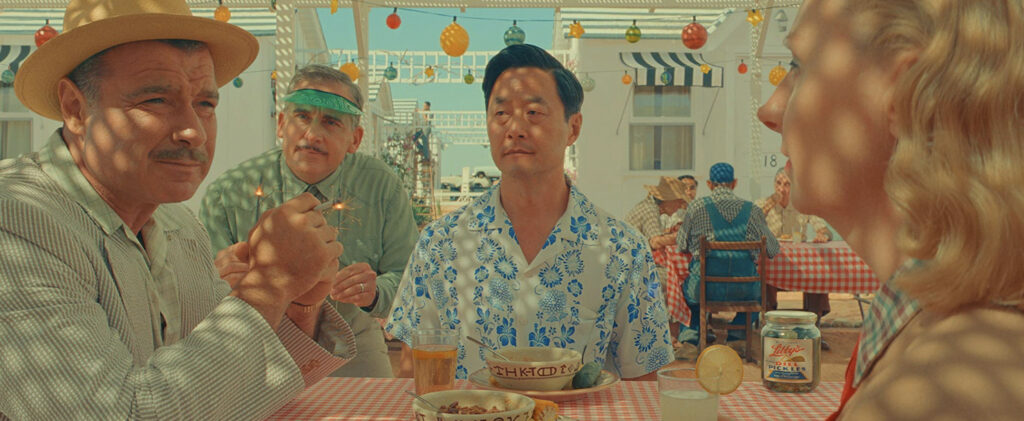
Q: Was there ever a moment where you felt a little in the dark or that you needed to get coached to get you through it?
BC: He still wants the actor to come in and say, “Here’s my interpretation of it.” I believe that my role here is to be without emotion. I am the character that is the conduit. I am delivering the exposition and telling the audience what they need to know to get into [the film]. I am just an intermediary. I stay out of the way so the faster I can speak I hand it off to the audience.
Q: You recently mentioned that you were going to be taking a break from acting in a few years.
BC: I’ve been very lucky for the past 25 years. I have worked nonstop and am so fortunate and blessed. I will never take that for granted. You never think of that when you’re an actor coming up because you’re always looking, reaching and going out there. If you get struck by lightning, like I did all of a sudden, that energy turns, and is coming at you. You’re kind of waiting and then you have to fend off things. I think I’ve played all the cards that are in my deck and I need to reach out. I didn’t want to start being redundant and derivative of myself.
I want fresh ideas. I want new concepts in the way I’m approaching the work. I think in order to get that, I need a reset, I need to shut down for a year just to have a real experience of life and at the same moment, it’ll be great for my marriage. My wife’s looking forward to it. We’ve been married for 34 years. There’s an energy that comes with it. There’s a psychology that comes with her being the guest of [Brian Cranston]. It’s not an equal footing sensibility. I need to have that relationship go into the next chapter. I thought that when I turned 70, which is only three years away, that I needed to step away, go someplace and just have a life and deal with that.
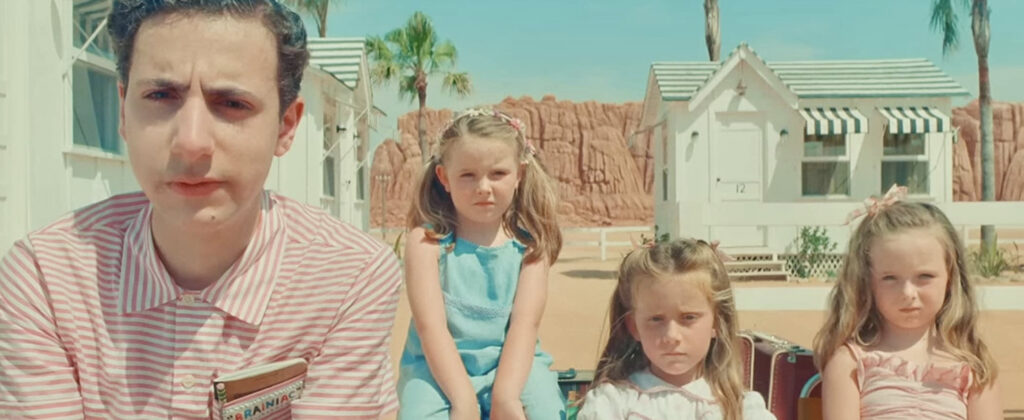
Check out more of Nobuhiro’s articles.
Here’s the trailer of the film.

